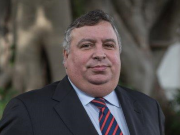Demos Project. Ombudsman visits the Autonomous Region of the Azores on a information campaign

A delegation of the Ombudsman travels to the Autonomous Region of the Azores (RAA) from 25-29 March on a mission to publicize his activity as an independent state body that defends people who see their fundamental rights violated or are harmed by unfair or unlawful acts of the administration or other public authorities.
As part of the Demos project, the mission will be in the Legislative Assembly of the RAA, visit a school in Faial and maintain contact with local authorities of the islands of the central group of the archipelago. Learn more here.
The delegation is composed of Deputy Ombudsman Joaquim Pedro Cardoso da Costa Adjunto (in the photo), the coordinator José Álvaro Afonso and the advisor João Batista who accompany the instruction of the complaints presented in the RAA. The Ombudsman’s office has a citizen support office that works in facilities assigned by the Representative of the Republic to the Azores, and its activity is accompanied by advisors in Lisbon.
Funded by the European Union, the Demos project is part of the Territorial Cooperation Program – MAC 2014-2020, which includes the archipelagos of the Azores, Madeira, the Canaries, as well as the third countries Cape Verde, Senegal and Mauritania. It aims to improve citizens’ knowledge of the functions and accessibility of Ombudsmen and to promote participation and the creation of a culture of transparency, efficiency and effectiveness in Public Administration.
Who we are?
The Ombudsman is an independent state body that defends people who see their fundamental rights violated or feel harmed by unfair or unlawful acts of the administration or other public authorities.
In Portugal, the Ombudsman is also the National Institution of Human Rights, and it is up to him to promote and defend human rights and ensure that the Portuguese State complies with the international conventions it has signed in this area.
The Ombudsman is also a National Prevention Mechanism and must ensure that Portugal complies with the UN Convention and Protocols against Torture and Other Cruel, Inhuman or Degrading Treatment or Punishment. It does so essentially through regular visits, without prior notice, to prisons and detention centers.
It has yet another unique characteristic: it is a one-person organ. That is, all the functions of the Ombudsman are constitutionally attributed to a person – in this case, Maria Lúcia Amaral – who is elected by the Assembly of the Republic by a two-thirds majority. To carry them out, the incumbent has a team of about fifty jurists and a small administrative body – the Ombudsman’s services. The Ombudsman has a permanent seat in the Council of State, which is the highest body for political consultation of the President of the Republic.
A delegation of the Ombudsman travels to the Autonomous Region of the Azores (AAR) from 25-29 March on a mission to publicize his activity as an independent state body that defends people who see their fundamental rights violated or are harmed by unfair or unlawful acts of the administration or other public authorities.
As part of the Demos project, the mission will be in the Legislative Assembly of the RAA, visit a school in Faial and maintain contact with local authorities of the islands of the central group of the archipelago. To access the program click here.
The delegation is composed of Deputy Ombudsman Joaquim Pedro Cardoso da Costa Adjunto (in the photo), the coordinator José Álvaro Afonso and the advisor João Batista who accompany the instruction of the complaints presented in the RAA. The Ombudsman’s office has a citizen support office that works in facilities assigned by the Representative of the Republic to the Azores, and its activity is accompanied by advisors in Lisbon.
Funded by the European Union, the Demos project is part of the Territorial Cooperation Program – MAC 2014-2020, which includes the archipelagos of the Azores, Madeira, the Canaries, as well as the third countries Cape Verde, Senegal and Mauritania. It aims to improve citizens’ knowledge of the functions and accessibility of Ombudsmen and to promote participation and the creation of a culture of transparency, efficiency and effectiveness in Public Administration.
Who we are?
The Ombudsman is an independent state body that defends people who see their fundamental rights violated or feel harmed by unfair or unlawful acts of the administration or other public authorities.
In Portugal, the Ombudsman is also the National Institution of Human Rights, and it is up to him to promote and defend human rights and ensure that the Portuguese State complies with the international conventions it has signed in this area.
The Ombudsman is also a National Prevention Mechanism and must ensure that Portugal complies with the UN Convention and Protocols against Torture and Other Cruel, Inhuman or Degrading Treatment or Punishment. It does so essentially through regular visits, without prior notice, to prisons and detention centers.
It has yet another unique characteristic: it is a one-person organ. That is, all the functions of the Ombudsman are constitutionally attributed to a person – in this case, Maria Lúcia Amaral – who is elected by the Assembly of the Republic by a two-thirds majority. To carry them out, the incumbent has a team of about fifty jurists and a small administrative body – the Ombudsman’s services. The Ombudsman has a permanent seat in the Council of State, which is the highest body for political consultation of the President of the Republic.
To learn more, click here.

